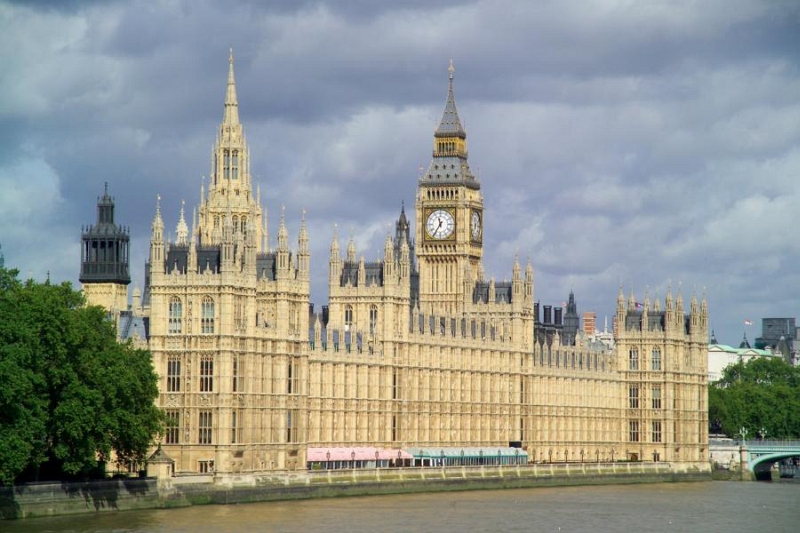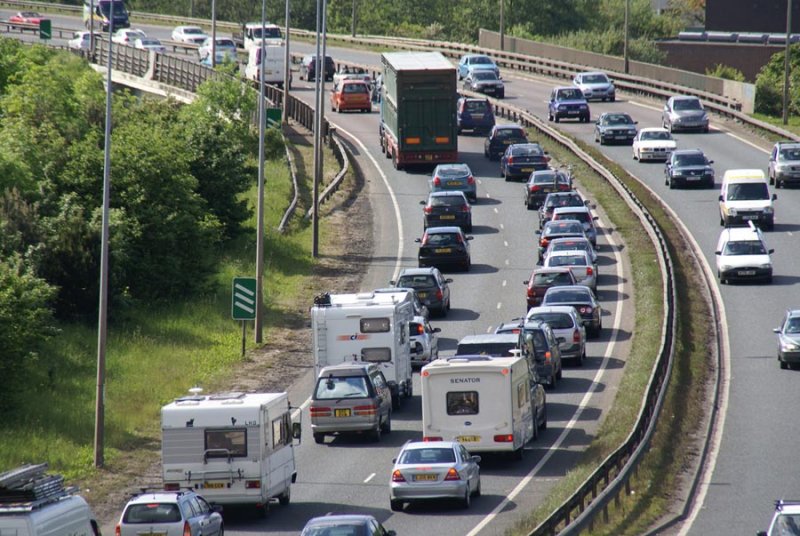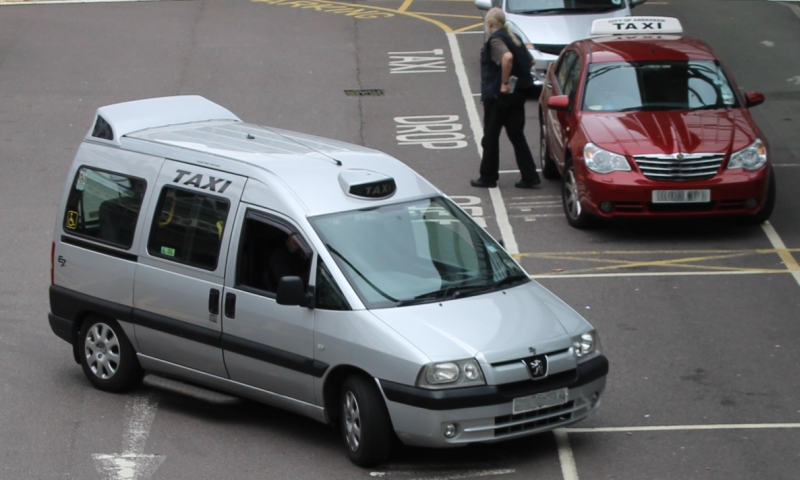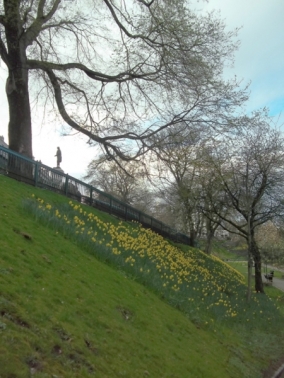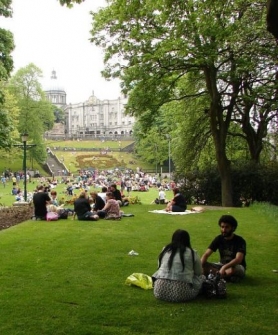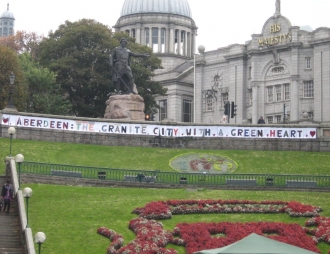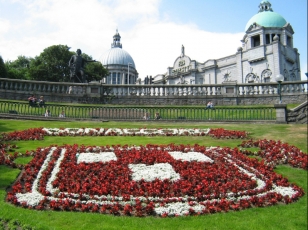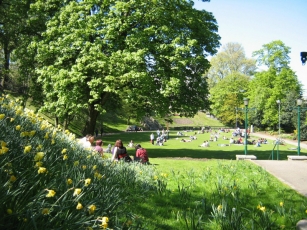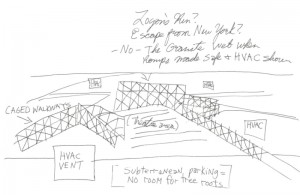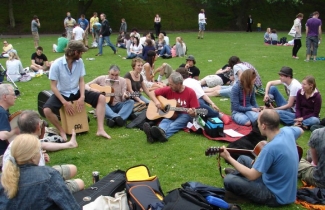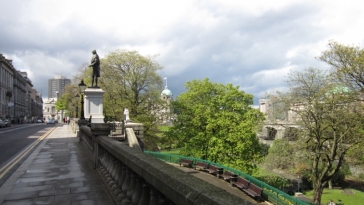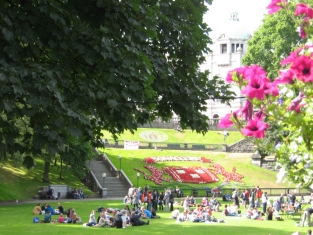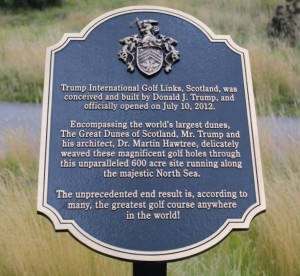
Plaque at Menie with wild claim that dunes are the world’s largest.
Suzanne Kelly sets out part 2 of her case for a public inquiry, examining the role of the Scottish Government, Scottish Natural heritage and the police.
“It’s a request about good governance, about the way planning rules are set and managed – about the way the relationship between officials and developers are kept within appropriate bounds…”
– David Milne, The Scotsman
http://www.scotsman.com/police-questioned-over-donald-trump
What’s wrong with the state of play at the Trump International Golf Links Scotland course and its genesis?
The following, among others, think quite a lot:
The institutions which would appear at the public inquiry are: Aberdeenshire Council, Scottish Enterprise, Police Scotland, Scottish Natural Heritage, and The Scottish Government. Their representatives – often the very people who would have been in place when things were going awry – are writing to the Committee, insisting everything is fine and all the evidence has already been examined. This is demonstrably untrue.
Information continues to emerge (e.g. from FOIs to Police Scotland and Scottish Enterprise; the ‘disappearance’ of MEMAG, (the environmental group meant to observe and recommend), and problems continue to either arise (e.g. the new course is set to border a public park) or they remain unresolved (e.g. bunds blocking Munro home).
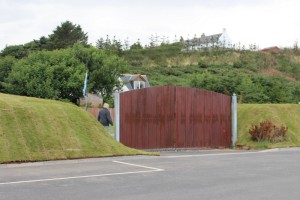 Those who gave the Trump golf complex project the thumbs up are giving a thumbs down to an inquiry into the emerging details of how they and their institutions acted in the past and present. No surprise there of course.
Those who gave the Trump golf complex project the thumbs up are giving a thumbs down to an inquiry into the emerging details of how they and their institutions acted in the past and present. No surprise there of course.
With no inquiry, the future for civil rights, journalistic freedom, equal protection of law, restrictions on quango interference with government, unchecked civil servant conduct, independence of local government and our environment (for openers) looks pretty bleak.
There are relevant issues that have never been addressed whatsoever :–
- the growing number of work taking place which require retrospective planning,
- the genesis and status of the bunds which cut properties off from light and view, and which have causing property damage (sand and dirt from bunds has blown into the Munro garden, home and motor vehicles)
- how the Shire insisted weekly site visits ensured no deviation was taking place,
- how MEMAG (set up as a result of the Scottish Reporter’s Report) proved to be such an inefficient environmental force and what its current status is
- how and why Dr Christine Gore (then with Aberdeenshire planning) came to communicate with lawyers representing Trump, seemingly taking direction from them – and how instead of being criticised she became promoted
- how efficiently the council, Scottish Natural Heritage and SEPA are monitoring the environmental situation (residents report trees have been buried; how a very large rubbish tip of mixed material (including unlabelled bottles possibly containing chemicals) came to be on the estate and how it was disposed of, what chemicals are being used, what is happening to biodiversity; what was their interaction with MEMAG, what chemicals are in use on the course;
- how the police dealt with the arrests of journalists Phinney and Baxter; how much time and effort they spent accompanying Trump/Trump personnel to and from the airport;
- how the police dealt with Michael Forbes, who was cautioned for removing £11 worth of plastic border flags put on land he believed was his;
- why the police chose not to pursue action against the Trump organisation which had allegedly gone onto the Milne property, removing items and causing damage – especially when Milne offered them a video of the event: they refused to take the evidence;
- why this application was called in in the first place – did government seek to ignore its own SSSI designations to allow a dining chum of the First Minister (one who has some unsavoury connections as Panorama revealed) to build a golf course and housing on one of our most unspoilt, environmentally sensitive regions?
Having looked at the responses from Aberdeenshire Government and unelected Scottish Enterprise, this second part of the article now looks at Police Scotland (formerly Grampian Police in our area), The Scottish Government, and Scottish Natural Heritage.
Police Scotland
Submission to the Committee by Derek Penman, Assistant Chief Constable, Policing North
http://www.scottish.parliament.uk/GettingInvolved/Petitions/PE01474
Police Comments on Scrutiny:
“Police Scotland remain completely neutral on all matters concerning the development of the Menie Project with our focus remaining on ensuring that officers approach their duties with integrity, fairness and respect for all parties involved, and only taking action where appropriate to address behaviour which breaches the criminal law.
“It is our position that all officers involved in the policing response connected with this development have carried out their duties in an impartial and transparent manner.
“Prior to Police Scotland and in response to media interest in relation to the police action around the Menie Project, Grampian Police commissioned an independent peer review, conducted by Northern Constabulary, which reported in November 2011 that there was good evidence that impartiality is a major factor in all decision making. The action taken was lawful, proportionate and in keeping with the strategic aims. There was no evidence of any individual, group or organisation being favoured’.
“Notwithstanding, Grampian Police acknowledged there were occasions where they could have provided a better service. On each of these occasions, explanations, and where appropriate, apologies have been provided to those concerned.”
“There are currently no outstanding complaints against the police nor, to the best of our knowledge, has any associated matter yet been referred to the Police Investigations and Review Commissioner. This is a legitimate avenue of recourse for any party who remains dissatisfied at the response to any complaint against the police, and also highlighted as an option by a committee member at the recent Public Petitions Committee.
“In the continued interests of transparency, balanced against a requirement to maintain confidentiality where appropriate, Grampian Police (and subsequently, Police Scotland) have made over 200 documents, emails and other records available to the public, including various media agencies and other individuals who have requested them. Most, if not all of these documents have subsequently been made widely available and/or reported upon, either by those who have requested them, or on the world wide web and/or through various media outlets.
“In conclusion, Police Scotland is satisfied that the policing response by Grampian Police into the development at Menie was undertaken in an impartial manner and has been subject to review.”
It seems incredible that Police Scotland claim all aspects of how they acted have been fairly, fully, independently investigated, and there is no need for the requested inquiry (as SE, Aberdeenshire, central government and others have tried claim). But they’re trying it anyway.
They have still not explained how they came to arrest two journalists
At the time of writing, their claims of disclosure and peer investigation aside, there are still outstanding issues; surely the letter’s author must know this. Issues which should be covered include alleged property damage and trespass at the Milne home, the cost of extra policing provided to Trump, the treatment of Michael Forbes, and not least how two journalists came to be arrested in the absence of any evidence or just cause.
With regard to the Milne Property, some people trespassed, removed fencing, and caused damage: David Milne has a video. The police refuse to explain why they showed no interest in this video, and refused to take action. A current FOI request concerning this incident is ongoing, but they will not say why their solicitor decided not to pursue the case, and why they refused to look at the evidence Milne offered. This hardly agrees with their assertion all information is in the public domain.
Police Scotland also refuse to say how much money has been spent by the taxpayer on policing Trump. The police seem to agree their presence is needed when Trump or his operatives travel to or from Aberdeen Airport to Menie. They admit some £8k was spent for a cancelled event – yet claim they could not determine the cost of extra policing given to Trump. Surely a check of payroll records for increased presence/overtime on Trump travel days would give this information.
It is most worrying to contrast the different treatment given to Trump compared to the caution given to Michael Forbes over boundary flags Trump agents put in a field Forbes believed he owns. He was later charged with theft – of £11’s worth of flags left in a field he believes he owns, when he had made efforts to give the flags back. The police also stood by when Trump agents went onto Forbes held property and caused damage. Police were allegedly tipped off that a ‘demonstration’ would be going on, although there was no sign of this, they remained and allowed Trump agents onto the disputed land, and watched as Forbes property was damaged. They simply stood by. By contrasting this incident with the police refusal to investigate the Milne damage/theft when they refused to look at evidence, and you can see that an independent investigation is needed with full disclosure.
Then we come to the arrest famously caught on film of two journalists whose crime seems to have been going to the Trump estate office to ask about restoring water to residents (the Trump builders damaged the local water supply, leaving residents without running water for a week; no remedial action was taken). Image control seems to have trumped robust, fair policing. Rob Edwards wrote an article detailing how the police put their efforts into managing the public relations aspects of a TV screening of ‘you’ve been trumped’ which showed them arresting – roughly arresting – Baxter and Phinney, who had been working on their documentary.
No such efforts seem to have ever been directed at determining who ordered the arrest, or how the police decided on the use of the controversial charge ‘breach of the peace’ (which seems to be a blank arrest warrant).
http://www.heraldscotland.com/news/environment/police-planned-pr-strategy-following-the-broadcast-of-bbc-television-documentary.21900432
Paul Holleran of the NUJ said of the journalists’ arrests:-
“This is blatant example of police interference aimed at stopping bona fide journalists from doing their job. Their footage shows they were asking very pertinent questions in a mannerly fashion as befits professional journalists. I believe this is a breach of human rights, and we are taking legal advice.”
http://www.academia.edu/1481204/Donald_Trumps_Ego_Trip._Lessons_for_the_New_Scotland
The police were happy enough to create a special initiative for policing the area. In September 2011 they wrote to me; here is an excerpt:-
“However, in Spring 2009, following the announcement of a number of strategic economic and infrastructure developments, Grampian Police established a short life ‘Critical Incident Preparation Group (CIPG)’ with a remit to coordinate the prepared phase of ‘critical incidents’.
“A ‘critical incident’ is determined in the National Policing Improvement Agency (NPIA) Critical Incident Management Practice Advice as;- ‘any incident where the effectiveness of the police response is likely to have a significant impact on the confidence of the victim, their family and/or the community’
“Accordingly, this development was founded on guidance contained within the NPIA manual and centred around the ‘three phases of critical incident management’ determined as
- “Preparation
- “Management
- “Restoring Best Confidence
“From this, a generic, local strategy relevant to Menie Estate and other similar developments was developed.
“This has been determined as;-
- “Maximise safety;
- “Minimise disruption;
- “Facilitate lawful protest;
- “Deter, detect, detain and report those responsible for unlawful behaviour.”
A public inquiry should look at the way this strategy evolved, who decided on its nature and application in principle, and not least its legality.
What police powers were invoked at the estate and where their lawful application was either overstepped (Phinney, Baxter) or ignored (Milne) needs to be examined, and flaws ironed out for the future.
is there not a huge potential for future abuse of power?
Photographer Alicia Bruce was aggressively threatened by an on-site security guard so much so she called the police. Their approach? They tried to dissuade her from making a complaint against the guard because he could get in trouble. Compare and contrast that with their arrest of Baxter and Phinney.
If the police do wish to be ‘restoring best [sic] confidence’ then they should submit to an inquiry.
A police state? If the police can stretch the power to ‘detect’ and ‘deter’ anything they deem potentially unlawful; if they have wide sweeping, unspecified powers to ‘maximise safety’ – is there not a huge potential for future abuse of power?
The power to issue cautions to those who have been arrested has led in the cases of Baxter, Phinney and in cautioning Forbes to situations where people have been denied the chance of going to court to state their side of the issue – while at the same time being in effect bound over not to do anything the police might not like.
It is intimidating. But is it lawful?
Likewise the application of ‘breach of the peace’ seems to be a very open-ended issue with potential for abuse and over-use. A public inquiry could ask the police to explain themselves on these points in this situation. Additionally, a recommendation for review of these wide sweeping powers would be most welcome.
There are signs the police were growing jaded by Trump’s demands http://www.heraldscotland.com/news/home-news/trump-accused-of-using-police-as-his-private-security-force.15321686 ; perhaps it is time for them to welcome this inquiry, explain themselves, and tell us who is accountable for this rather iniquitous catalogue of events, and to give assurances things will improve.
Everyone understood their roles; everyone acted perfectly
Scotland is now a country that locks up journalists, on the say-so of an entity with links to organised crime (as Panorama claims). If that alone is not grounds for an inquiry into the entire saga, then what would be?
The Scottish Government
Submission to the Committee by Scottish Enterprise Chief Executive, Lyndsey Murray, Decisions Manager, writing on behalf of the Directorate for Local Government and Communities – Planning and Architecture Division
http://www.scottish.parliament.uk/GettingInvolved/Petitions/PE01474
Scottish Government Comments on Scrutiny: (opens with lengthy history of the decision being called in, Scottish Reporters creating their report)
“The Scottish Government has released a substantial amount of information into the public domain through evidence given to the Local Government & Communities Committee’s inquiry … a significant number of answers given to Parliamentary Questions and responses to a substantial volume of correspondence to date. The information released shows that Ministers are fully aware of their responsibilities in relation to planning and have discharged these responsibilities fairly and responsibly having regard to the Ministerial Code.
“The documents also show that civil servants involved in the handling of the case have fully met the standards of propriety expected of them as per the Civil Service Code. Kevin Dunion, the former Scottish Information Commissioner, in an interview with Holyrood magazine in December 2011 stated:
“’I think a sensible government, and we have seen a couple of examples of this in Scotland where the Government has done it very well, where they say something is of such public interest that let’s get into a position of strength and put everything in the public domain. Our government did that over the Trump development which was causing a lot of headlines and the Government said, well, here is the information that we have regarding our engagement with Donald Trump.’”
“Scottish Parliament‘s findings in relation to the handling of the call in of the application by Scottish Government.
“The Scottish Parliament’s Local Government and Communities Committee published a report, on 14 March 2008, on their consideration of the Scottish Government’s handling of the “call-in” of the outline planning application which concluded that Ministers and officials had acted in accordance with planning legislation. Paragraph 63 of this report sets out a detailed chronology of events, established through a detailed examination of available documentation and through questioning of the key participants.
http://www.scottish.parliament.uklparliamentarybusiness/PreviousCommittees/18875.aspx
“Post decision on the outline planning consent
“Aberdeenshire Council is responsible for planning matters within its area and for enforcing the conditions attached to the grant of planning permission for Menie Estate. Any planning application for development at Menie Estate, subsequent to Ministers’ approval of outline consent in 2008, is a matter for the planning authority.”
And there it is. Everyone understood their roles; everyone acted perfectly, and if you don’t believe Murray, you can believe an excerpt from 2011 from the ex-Information Commissioner in Holyrood Magazine.
No mention of Christine Gore dealing with Anne Faulds of the Trump legal team. No impropriety in the transatlantic wining and dining.
No problem with the Reporters’ Report (for openers it uses emotive, leading, subjective terminology when referring to the proposed development – ‘world-class’.. ‘the applicant estimates that it would bring major benefits…’ ‘a course which avoided the SSSI would not achieve the applicant’s ambitions and the development would not proceed’.. and some clearly overly optimistic promises: ‘an estimated 4,694 net full time equivalent construction jobs… 1,237 net full time equivalent jobs from ongoing operations, both at the Scottish level.’ (see pages 6 and 7 of the Report – http://www.scotland.gov.uk/Resource/Doc/212607/0067709.pdf
No mention either of the curious status of Professor Bill Ritchie, which is nearly as cryptic as the MEMAG he headed. He is listed as being a pro-Trump witness and yet the document also contradicts this on Page 81 where it states:-
“[Ritchie] gave geomorphological advice to TIGLS on an independent basis, based solely on scientific judgement. He does not support or oppose the proposed development at Menie Links.”
Was Ritchie reimbursed for this ‘independent advice he gave Trump? He would eventually head MEMAG (whether any fees were paid to the mysterious MEMAG’s members would be very interesting to learn).
there is more evidence that this knowledge was not applied
How you can claim independence while consulting Trump and then create a role for yourself within MEMAG, which you recommended be created should make a fascinating conversation. (I should love to hear more from this University of Aberdeen professor, but he is not answering emails at present).
Did Dr Christine Gore, then in Planning at Aberdeenshire understand her role as well as Lyndsey Murray asserts? If so, why was she dealing with Ann Faulds?
Was it above reproach for Salmond to have dinner dates with Trump when the plans were being formulated?
Despite Murray’s assertions everyone knew their roles, there is more evidence that this knowledge was not applied. There was the famous phone call with Sorial present – is and other instances of our local and central government meeting with Trump camp are detailed as Murray says in the Local Government and Communities 5th Report 2008 Planning Application Processes (Menie Estate). http://news.bbc.co.uk/1/shared/bsp/hi/pdfs/13_03_08_trump.pdf
It shows a great level of interaction with local planners, central government and Trump factions – and virtually no contact with the government’s environmental entities. Its scope seems to be the planning process and sequence of events. It is certainly damning in places, but it would feed into the proposed inquiry – certainly it would not replace it due to its limited scope.
Point 45 is itself worthy of some attention by an inquiry:-
“It is important to note that the provisions of the 2006 Act relating to the hierarchy of developments are yet to be enacted and do not apply to the Trump application. As such the Trump application is neither a national or major development, as defined in the 2006 Act.”
http://news.bbc.co.uk/1/shared/bsp/hi/pdfs/13_03_08_trump.pdf Page 8
In light of the above, is it wrong to wonder if the act of calling this application in was a political one?
Murray would point out that the information is in the public domain for the TIGLS development, and that everyone in the chain observed the proprieties. He would reach a conclusion favouring his government and his office; the facts are as we have shown just a bit out of sync with his (bias?) conclusion-drawing. A particular event, which the 2008 refers to as ‘brief’ is this:-
“Aberdeenshire council officials disclosed that they had to terminate a telephone discussion with Jim McKinnon, Scotland’s chief planner, on the disputed application, when they realised that members of the Trump Organisation were in his office.
“The phone call was just hours before Mr McKinnon informed councillors that Scottish ministers had taken control of the planning decision, and less than a day after Mr Salmond met with Mr Trump’s team.”
http://www.telegraph.co.uk/news/uknews/1572543/Salmond-faces-sleaze-claims-in-Trump-row.html
In light of First Minister/SE/Trump dinners, a phone call with Sorial present to top planners, Gore communicating with Faulds, no one appearing to seek government advice (only the Trump team’s advice seems to have mattered), Murray’s assurances are not as comforting as he would have us believe. It is inquiry time.
Scottish Natural Heritage
Submission to the Committee by Ewen Cameron, Tayside & Grampian Operations Manager.
http://www.scottish.parliament.uk/S4_PublicPetitionsCommittee/.pdf
SNH Comments on Scrutiny: They objected to the plans; they have been in a largely consultative position; they will supply documentation if required. Unlike all other respondents, they are not saying there is no need for a public inquiry.
Passages, frankly, boring ones, about dune shift were not going to stop Trump
You have to feel a bit sorry for SNH; they were certainly not invited to any steak dinners; they were not invited to the Marcliffe; they did not lobby government – perhaps they did not think they needed to.
After all, the law was supposed to protect the environment, a golf course can be built most anywhere, and surely Scottish Enterprise and VisitScotland – two quangos – could not successfully wine, dine and lobby their goals successfully in view of environmental law? Alas, that’s what happened.
If the SNH submission to the Reporters had been as emphatic, enthusiastic, promise-filled and accessible as the submissions for Trump, things might have been different. Passages, frankly, boring ones, about dune shift were not going to stop Trump. Perhaps they felt that Professor Ritchie, heading MEMAG, would be all the environmental enforcement they needed?
As we’ve seen, the professor professed neutrality, while consulting with Trump and while planning MEMAG, which he would join. MEMAG has faded; it has removed its minutes (the last ones indicated communication failures and the lack of Trump attendance at meetings). No one including central government can tell me precisely what its status is.
And yet SNH indicated in its letter to the Petitions Committee:-
“The ecological clerk of works copied us into reports which they sent regularly to Aberdeenshire Council on behalf of Trump Golf Links Scotland… we would also raise matters in MEMAG meetings. We have attended regular meetings of MEMAG since its inception.”
The letter is dated 5 July 2013. When did SNH meet MEMAG last?
How can a system allow a developer to be his own watchdog?
Who was in charge of the environment? It seems paid Trump personnel. Who salaried the ecological clerk of works? MEMAG was paid for by Trump. How can a system allow a developer to be his own watchdog?
I do feel for the SNH; it would be interesting to know if any political pressure or influence was used to dissuade them from proactively protecting the area. It does not seem that far-fetched an idea; and an independent public inquiry could ensure future environmental monitoring and environmental protection powers are guaranteed, and responsibilities clear-cut.
Case Proven: An Inquiry Is Needed
In Part 1 of ‘Menie: The Case For A Public Inquiry’ an overview was given on Aberdeenshire Council’s and Scottish Enterprises’ written submissions to the Petitions Committee that all was right with the world.
With information still coming out – as well as having been ‘lost’ – by Scottish Enterprise (which claims it has lost/discarded correspondence re. Jack Perry/Trump), the case for an inquiry has never been clearer. The public inquiry is required, not only to re-examine a flawed report created by the Scottish Reporters at the time, and all the other issues, but to ensure that lessons are learned.
The institutions which should be eager to clear the air and explain their seemingly bias, unorthodox actions are instead claiming they’ve already released all their information, and that they have done nothing wrong. Where such investigations do exist, such as for the police and the Scottish government, the examining bodies have links to the organisations they were investigating.
Given the conclusions that such examinations reached, exonerating those involved from any wrongdoing, the case for independent inquiry is further strengthened. Phonecalls from the Marcliffe with Sorial present? Police refusal to investigate the damage/theft at the Milne property – and their ongoing refusal to explain this are absolutely at odds with claims that any robust, independent inquiry has taken place.
If a public inquiry doesn’t take place, what kind of local and national government do we have in place? What kind of accountability will we see for what has happened? What kind of message would the absence of an inquiry send?
It would enforce the ability of powerful developers to construct how they please
If the inquiry does not take place, it would be a thumbs up for government ministers and quangos meeting with planning applicants when plans are under scrutiny. It would be affirmation that quangos can lobby government and prevail with their plans, overriding environmental protection designations such as SSSIs. It would be a go-ahead for planners to take legal advice and suggestions from lawyers representing planning applications.
It would be a green light for unaccountable, ineffectual ad hoc environmental ‘watchdogs’ to be invented, trotted out to demonstrate some sort of environmental concern exists; then to in fact be ignored by developers, to fail dismally to communicate and protect, and to be mysteriously wound down when no longer needed for press calls.
It would be a go-ahead for further national call-ins of local matters. Where would this end?
It would be carte blanche for police to enforce laws or not, acting arbitrarily. It would enforce the ability of powerful developers to construct how they please, in effect walling up residents with giant bunds and dying trees. A refusal to hold an inquiry would be nothing short of an insult to the 19,000+ people who want one. It will mean status quo at this out-of-control development.
Possibly worst of all, it will send a clear message out to future developers that anything they want is theirs for the price of a few expensive dinners.
Until that inquiry, we are not just open for business, we are selling our heritage, biodiveristy and environment for money, and we seem to be in bed with what seems to be a rather unsavoury developer.
- Comments enabled – see comments box below. Note, all comments will be moderated.
 Tally Ho! Well, it’s been a colourful week in the Granite City; plans for the city centre are being drawn up, and that’s something you don’t see every day (unless you get the P&J). Apparently all our problems are solved if we let one Sir Ian Wood give us £50 million, and let him raise (or is that ‘raze’) Union Terrace Gardens.
Tally Ho! Well, it’s been a colourful week in the Granite City; plans for the city centre are being drawn up, and that’s something you don’t see every day (unless you get the P&J). Apparently all our problems are solved if we let one Sir Ian Wood give us £50 million, and let him raise (or is that ‘raze’) Union Terrace Gardens.

